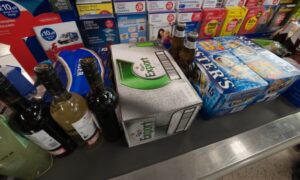Britons spent an extra £261m on alcohol in grocery stores last month as the government’s eat out to help out scheme came to an end and a 10pm curfew on pubs and bars began.
Total sales in supermarkets and corner shops rose 10.6% in the four weeks to 4 October, up from 8% in the previous month, with stores the busiest they had been since a wave of stockpiling in March according to the latest market data from research firm Kantar.
Sales of toilet roll and flour rose by 64% and 73% respectively in the week to 27 September, but Fraser McKevitt, the head of retail and consumer insight at the data company Kantar, said there was little evidence of panic buying as the number of supermarket trips that week was well below that before the national lockdown.
“Shoppers are moving a greater proportion of their eating and drinking back into the home. This is likely a response to rising Covid-19 infection rates, greater restrictions on opening hours in the hospitality sector, and the end of the government’s eat out to help out scheme,” he said.
As fears built of a second wave of the virus, online sales rose by 76% year on year in the month to 4 October. Waitrose was the fastest-growing online retailer after splitting with Ocado, which increased its sales by nearly 42% after launching with its new partner, Marks & Spencer.
Morrisons’ sales growth was the fastest of the UK’s four biggest supermarkets – Tesco, Sainsbury’s and Asda – as it benefited from new delivery services including food boxes, a partnership with Amazon and expansion of its online shop.
Mike Watkins, the UK head of retailer and business insight at the market research firm Nielsen, which also identified a continued shift to online grocery shopping, said he expected about 15% of groceries to be bought via the internet in the run-up to the festive period, about double that last year, as shoppers increasingly prefer buying from home.
“While shoppers are slowly becoming more comfortable returning to stores, online remains the biggest winner and a third of shoppers who shopped online in the last 12 weeks are new to online. Shoppers who first shopped online in the early summer are staying online and making repeat purchases, which means online is likely to take an even bigger share of sales as we head into the festive period,” Watkins said.
